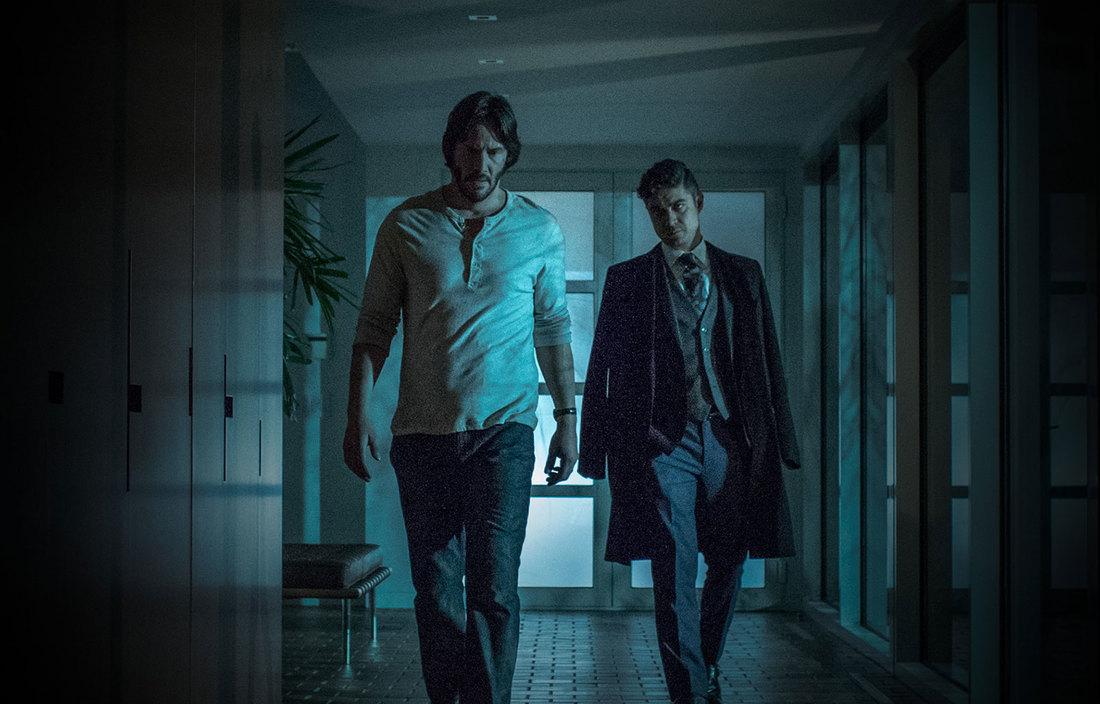The setup is perhaps why John Wick 2 never clicks. John needs to accept the Marker to get the film rolling, but refusing blackballs him from an organization that he doesn't want any part of anymore. So what? It's not honor that gets John to commit an unhonorable fratricide, though if it was, his character might get more compelling than the brain-splatter factory he otherwise is. John's dead wife, played in phone messages by Bridget Moynahan, continues to be used as a motivator, but someone who remains a complete cipher. Resigned obligation is what gets John Wick 2 rolling. The original spent its opening scenes building a character who was grieving and alone, such that the inciting incident is a potent jolt for the viewer and for John. The sequel throws the impetus for the film on whatever rules returning writer Derek Kolstad wants to make up.
This unwillingness to motivate characters might be based on Reeves' strengths and weaknesses as an actor, and in what's always been a mostly-silent character, he's given even less to say here. Stahelski and Kolstad understand that, for their franchise, motivations are far down the list from the stunts. John Wick 2 opens with a projection of a silent movie stunt on a wall, paying homage to Stahelski's decades-long career as a stuntman before a modern car stunt goes flying down the street beneath the projection. This franchise is about an appreciation of practical set-pieces from a comfortable camera distance and with a minimum of edits, and the sequel certainly has them. Something's missing from the sequel, though, whether it's the surprise or the staff. Leitch took the original's cinematographer and editor with him to Theron's Atomic Blonde, and that could have something to do with it. The sequel contains nothing as thrilling as the original's initial nighttime home invasion thwarting or the club scene. Maybe once you've seen one squad of goons get taken out, you've seen them all.
One of the greatest joys of John Wick is seeing the assassin network function in broad daylight as an upscale hotel with all the attendant services. Laundry, food and drink, and body disposal are all available through the concierge, with the proper amount of gold tokens, of course. The sequel builds on the Continental, taking it to Rome and showing competing networks of further down the swank scale, but again, it only feels like more of the same thing. More Continental means more assassins, but compared to other pure action films like The Raid, all but one come off as forgettable. Ruby Rose plays a mute bodyguard whose disability functions as affectation. Common stands out as Santino's sister's bodyguard, and he shares a bone-crunching duel with Reeves, but he's the sole new player to put a definitive stamp on the franchise.
It's frustrating that the originality and the vigor of John Wick has already been spent, with the sequel barely eliciting the exclamations these bloody action films traffic in. There's less passion and pathos in John Wick 2. The original carried with its rampage a sense of justice being enacted while the sequel is flimsily premised on a man who's killed potentially thousands of people being able to live in peace. My favorite film, Kill Bill, is about a similar character atoning for her misdeeds, cleansing her part of the world of an evil she was complicit with. Kill Bill's Bride chopped her way through a lot of goons, but looking cool while doing so wasn't enough there and it's not enough here. Drained of a rooting interest, John Wick 2 is just so much admittedly-impressive action. A video game splashed up onscreen doth not a movie make. C

 RSS Feed
RSS Feed